Reply To:
Name - Reply Comment
Last Updated : 2024-04-25 18:55:00
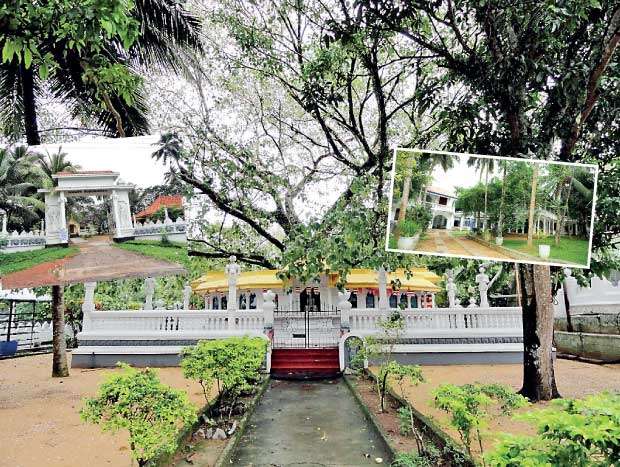
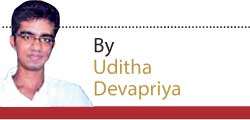 On my way home after watching Jayantha Chandrasiri’s Garasarapa a month or so ago, I began to think about the theme at the centre of that film: is demonology really psychology? Scholars will contend that there is a fine line to be drawn somewhere between the two and that most if not all those mythical practices we indulge in can be rationalised through modern science. The ‘daha ata sanniya,’ after all, is a convenient way of explaining the many sicknesses and diseases which invade our body from time to time, while those beings which are said to visit us and make us sick may well be symptoms and products of sleep paralysis (a condition in which we think we are awake, but are actually sleeping and halucinating). Still, the message at the end of Jayantha’s film perturbed me: isn’t there some sort of a link between what the West has discovered and what the East has prescribed for thousands of years?
On my way home after watching Jayantha Chandrasiri’s Garasarapa a month or so ago, I began to think about the theme at the centre of that film: is demonology really psychology? Scholars will contend that there is a fine line to be drawn somewhere between the two and that most if not all those mythical practices we indulge in can be rationalised through modern science. The ‘daha ata sanniya,’ after all, is a convenient way of explaining the many sicknesses and diseases which invade our body from time to time, while those beings which are said to visit us and make us sick may well be symptoms and products of sleep paralysis (a condition in which we think we are awake, but are actually sleeping and halucinating). Still, the message at the end of Jayantha’s film perturbed me: isn’t there some sort of a link between what the West has discovered and what the East has prescribed for thousands of years?
There must be, but if there is, no one has taken the trouble of ascertaining what it is. To begin with, the methodologies that each civilisation resorts to when it comes to illnesses are more than just a world apart. The West sees ailment in terms of symptom and cure, the East sees it in terms of reason and prevention. The West diagnoses, the East predicts. The West looks towards the short term exit, the East prefers the long term recovery. In this clash of civilisations, there is, I feel, a nexus somewhere. Where it is, we don’t rightly know as of yet. That is a tragedy.
Gautama Buddha, in the “Sabbe Pruthugjana Ummaththaka” of the Mūlapariyāya Sutta in the Majjima Nikaya, dwells at length on insanity. Our own civilisation has tabulated mental illnesses in terms of phobias and manias. For instance, melancholia, that most romantic of all forms of depression, is defined as “Pitta Unmadaya”, while the more disturbing nymphomania is described as “Kama Unmadaya”. All this goes to show that ours is not a society, as is commonly imagined, that taboos insanity. The reason as to why it has become so stigmatised in this country today has less to do with Buddhism and Sinhala culture than with the culture of a largely urban and middle class hypocrisy which we’ve for some reason embraced.
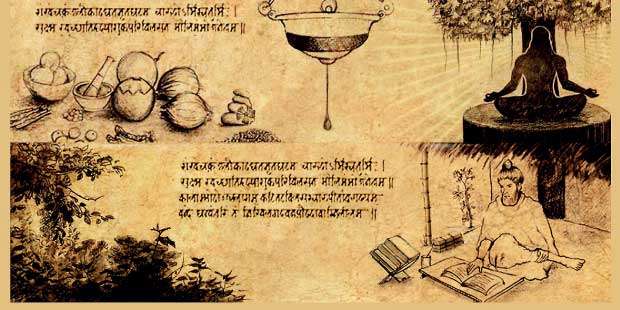
Dr. Saman Hettige would agree. The head of the first mental hospital in Sri Lanka based entirely on Ayurveda, he hails from a family of physicians that can be traced to the 19th century. The hospital, Manasa, is located in a suburb in Boralesgamuwa called Neelammahara. Until around 10 years ago, Boralesgamuwa was a veritable “green desert”, with nothing much to look forward to. Then the roads opened up, and with them the parks, the jogging paths, and the waterways which adorn much of the Colombo-Kesbewa route. Neelammahara has been given a facelift through all these developments and Manasa, which was closeted until then, has finally “come out”. Before I get to how the hospital operates, therefore, a brief perusal of its history and the history of its founders is called for.
The methodologies that each civilisation resorts to when it comes to illnesses are more than just a world apart. The West sees ailment in terms of symptom and cure, the East sees it in terms of reason and prevention. The West diagnoses, the East predicts.
Hettige’s ancestry, as I mentioned earlier, goes back to the 19th century. It all began when Rajadi Rajasinghe’s physician, Shailindrisinghe Padithuma, left for Dickwella after the annexation of Kandy in 1815. There, one of his sons (Dickwella Sudakshi) vowed to continue the family line, and he kept his vow once he left the South and moved to a barren village in Neelammahara, where he commissioned a temple (the Neelammahara Raja Maha Viharaya). Under that temple’s watchful gaze, Sudakshi taught Ayurveda to generations of physicians and healers, namely Werahera Sobitha, Arawwala Seelalankara and Dehiwela Dhammaloka. Dhammaloka’s student was D. S. Hettige, Dr. Saman’s father. Later, after his guru’s death, he thought of building a mental hospital, one which would operate, not on the profit motive, but on the strength of communal bonds. He would get it completed in 1890.
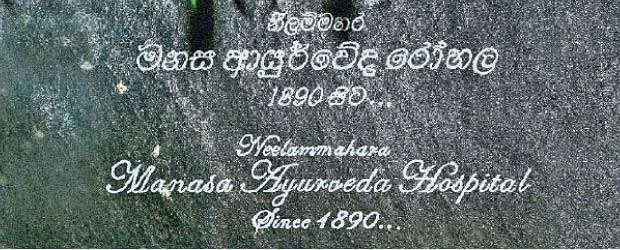
Dr. Saman explains. “At the time my father just handed patients over to villagers, to be looked after under his orders. Back then there was a widely shared sense of camaraderie. People looked out for each other. They knew what their friends were doing. But once the Second World War ended and they moved out of the village, they had less time to look after their neighbours. This became a problem, so much so that we were forced to rethink our strategy and turn the place into a conventional hospital.”
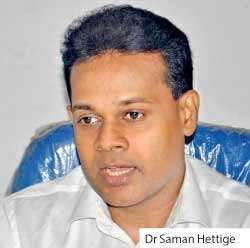
Was it successful, I ask him. “We were surprised at the response. Pretty soon, we went down as one of the first deshiya establishments dedicated to mental illness. Mind you, not just in Asia, but in the whole world as well!”
A second glance can help confirm these assertions. Still, having had a look around, I am wary of describing Manasa as a hospital, though Dr. Saman concedes that it is nothing more than that. I also don’t agree with his contention that it may be among the world’s first such deshiya institutions (even if we trace its history back to 1890), a point he himself agrees with when he tells me that the late Dr. D.V.J. Harischandra observed and noted tribesmen throughout parts of Africa treating patients relegated as madmen and lunatics by their societies.
As for Manasa itself, suffice it to say that it has grown considerably since its establishment and now has enough room to warrant treatment for around 40 patients. What’s even more commendable, however, is the way these patients are treated.
Whenever it comes to mental illness, the first thing that comes to my mind are those lobotomies and surgeries I associate with hospitals in general. Vindana and Kalpana Ariyawansha, in Premaya Nam, did a commendable job in demolishing these misconceptions and mythical associations. And yet, mental health treatment in the West tends to unnerve me. Remember “One Flew Over the Cuckoo’s Nest”?
On that basis, thankfully, Manasa is a breath of fresh air, since it operates on the principle that each patient has unique characteristics and should not be classified or taken in as a mere statistic. “Unlike what is prescribed in the West, we don’t isolate those we take in. We always group them. Sure, they can get violent, in which case we have to treat them in isolation. But our rationale is that by getting together, we can dispel most if not all those mental illnesses that beset us. This can even help those who harbour suicidal tendencies.”
And it’s not just local patients that they’ve cured. They’ve even treated patients from abroad. “Once we admitted the daughter of the Maharaja of Mysore. She’d been to other countries, in the West and East. But we were the ones who treated her really well. As a token of appreciation, we were invited by the Maharaja to Mysore, where at the end of our ‘trip’ we were gifted with two elephants. One of them, Raja, carried the ‘Daathu Karanduwa’ at the Kandy Perahera for many, many years.”
At this point, Dr. Saman offers some reflections on his field. I ask him as to what demographic suffers the most on account of depression and other serious ailments. He argues that it is the child, adding that it all really boils down to the way we are taught to deal with stress. “It’s an open secret that we have institutionalised an exam-centred culture here. We pressurise our children until Grade Five over the ‘shishshathvaya’ and pressurise them even more at their O Levels and A Levels.”
This is a well known fact, and for him, it unravels a rift between the individual and his environment. “We handle pressure very differently from one another. Regardless of how long we take to recover and adjust, however, the world just keeps on moving.” And that is not all: as a people, we can’t seem to affirm life anymore.

I suspect that history and tradition might help us here. Dr. Saman agrees. “We have a rich civilisation which stems from Buddhism. Take our Jataka stories. They didn’t just preach morals, though they’re used to propagate morals today. They also affirmed life. You didn’t come across heroes and villains like you do in countless books and films. You came across human beings, flawed, imperfect, and also multifaceted. It was this strange dualism which shaped our people. With contemporary society’s obsession over achieving results at any cost, we have, I fear, forgotten that, and in forgetting and abandoning that, we are promoting a culture of rampant self-neglect.”
Sangeetha Weeraratne, as the protagonist’s lover (now grown older) in Garasarapa, argues for a fusion of the West and East when it comes to mental illness. Personally, I don’t think such a fusion is impossible, but as of yet, the two ways of looking at the world (the West in terms of prescription, the East in terms of prevention) have spilt over and made themselves so evident that there’s precious little we can apart from choosing one over the other. At Manasa, however, you will come across one way of treatment which you will not at most other establishments. It is time to pay a visit, I feel. And not as a patient.
UDAKDEV1@GMAIL.COM
Hansi Hiroshani Senevirathna Wednesday, 15 January 2020 03:39 PM
Good Experience....

Add comment
Comments will be edited (grammar, spelling and slang) and authorized at the discretion of Daily Mirror online. The website also has the right not to publish selected comments.
Reply To:
Name - Reply Comment
US authorities are currently reviewing the manifest of every cargo aboard MV
On March 26, a couple arriving from Thailand was arrested with 88 live animal
According to villagers from Naula-Moragolla out of 105 families 80 can afford
Is the situation in Sri Lanka so grim that locals harbour hope that they coul